With their charming personalities and vibrant plumage, Cockatiels have become increasingly popular as pets among bird enthusiasts. These small parrots are known for their playful nature, ability to mimic sounds, and affectionate bond with their human caregivers.
However, like any other pet, cockatiels can experience health issues that require attention and care. One common concern that may cause alarm for cockatiel owners is the sound of their beloved bird coughing.
The question “Why is my cockatiel coughing?” lingers in the minds of concerned owners who want to ensure the well-being of their feathered friend.
Addressing health concerns in cockatiels is paramount to maintaining their overall health and happiness. In this article, we will explore the possible causes of cockatiel coughing, the signs that indicate a severe problem, and how to treat and prevent this issue effectively.
By understanding the reasons behind cockatiel coughing and taking appropriate measures, we can ensure the well-being of these delightful avian companions.
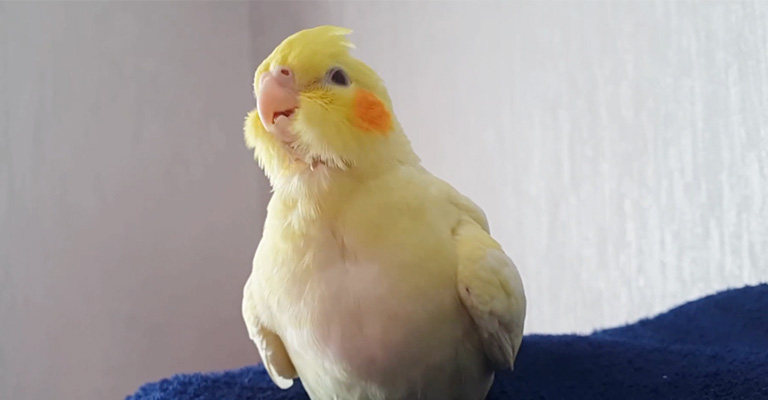
Why Is My Cockatiel Coughing?
Coughing in cockatiels can have various underlying causes, ranging from respiratory infections to environmental factors, nutritional deficiencies, and physical irritants. Understanding these potential triggers is crucial in identifying and addressing the root cause of the coughing episodes.
Respiratory Infections
Respiratory infections are one of the leading causes of coughing in cockatiels. Bacterial, viral, and fungal infections can affect the respiratory system, leading to coughing as a defensive mechanism.
Bacterial infections
Bacterial infections, such as those caused by Chlamydophila psittaci or Mycoplasma species, can invade the respiratory tract of cockatiels. These infections may result from exposure to contaminated environments or contact with infected birds.
Viral infections
Viral infections, including avian influenza or avian respiratory viruses, can cause respiratory distress and coughing in cockatiels. These viruses can spread through direct bird-to-bird contact or exposure to contaminated surfaces.
Fungal infections
Fungal infections, such as aspergillosis, can affect the respiratory system of cockatiels, leading to coughing, wheezing, and difficulty breathing. Fungi are commonly found in damp environments or contaminated bird feed.
Environmental Factors
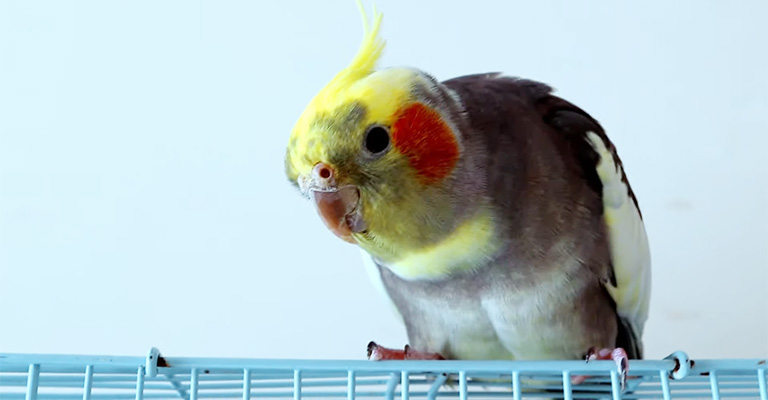
Environmental factors can also contribute to cockatiel coughing, mainly if the bird’s living conditions are not optimal.
Dust and allergens
Excessive dust or allergens in the bird’s environment can irritate its respiratory system, leading to coughing. This may include dust from bedding material, feather dander, pollen, or household allergens.
Poor air quality
Cockatiels are sensitive to poor air quality resulting from inadequate ventilation, high humidity levels, or exposure to pollutants. Stale or polluted air can irritate their respiratory system, triggering coughing.
Smoke exposure
Exposure to tobacco smoke, cooking fumes, or other types of smoke can harm cockatiels’ respiratory health. Inhaling smoke can cause irritation and coughing episodes.
Nutritional Deficiencies
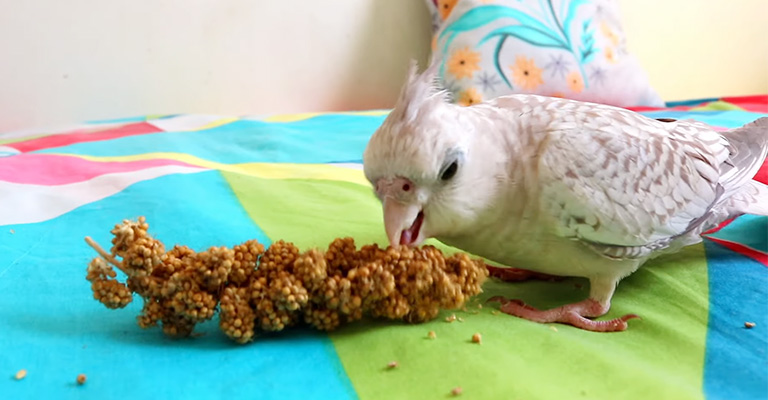
Dietary imbalances and nutritional deficiencies can weaken a cockatiel’s immune system and make them more susceptible to respiratory issues.
Lack of Vitamin A
A deficiency in Vitamin A, which is essential for maintaining respiratory health, can lead to respiratory infections and coughing. Cockatiels primarily obtain Vitamin A from fresh fruits and vegetables, so lacking these foods can contribute to deficiencies.
Imbalance in diet
An imbalanced diet lacking essential nutrients can compromise a cockatiel’s overall health, including the respiratory system. Poor nutrition weakens their immune system, making them more prone to respiratory infections and coughing.
Physical Irritants
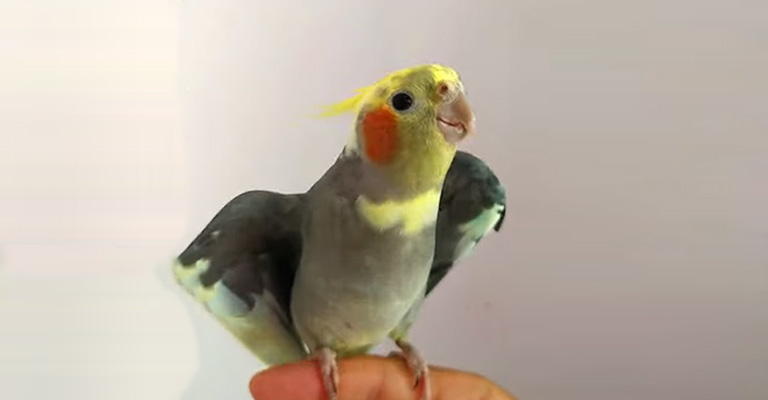
Certain physical irritants present in a cockatiel’s environment can trigger coughing episodes.
Feather dust
Cockatiels produce feather dust during preening, which can become airborne, irritating their respiratory system. Excessive feather dust in the air can lead to coughing and respiratory distress.
Chemical fumes
Exposure to solid chemical fumes, such as cleaning products or insecticides, can irritate a cockatiel’s delicate respiratory system, causing coughing and respiratory distress.
Perfumes and aerosols
Strong scents from perfumes, air fresheners, or aerosol sprays can be harmful to cockatiels. Inhaling these substances may lead to coughing and respiratory irritation.
Understanding the various factors that can cause cockatiels to cough is essential for identifying and addressing the underlying issue.
By providing a healthy and suitable environment, a balanced diet, and regular veterinary care, cockatiel owners can help prevent and manage coughing episodes in their beloved pets.
When Does Cockatiel Coughing Indicate A Serious Problem?
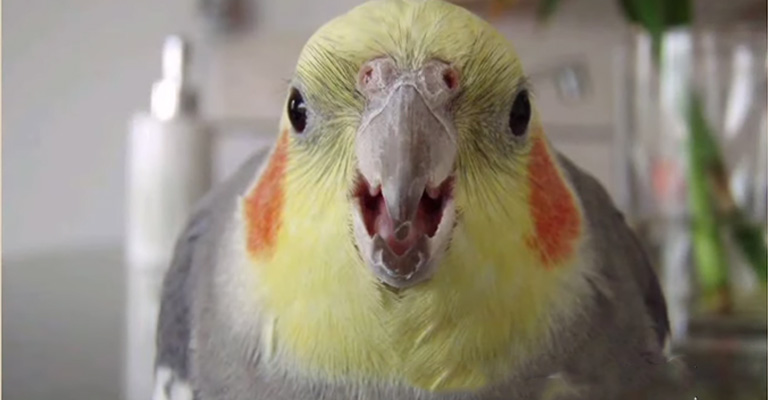
Coughing in cockatiels can cause concern and may indicate an underlying health issue. While occasional coughing may not always be alarming, there are certain factors to consider that can help determine whether the coughing is indicative of a more severe problem.
Frequency And Intensity Of Coughing
When a cockatiel coughs frequently and intensely, it suggests that there may be an underlying respiratory issue. Persistent or severe coughing should not be ignored, as it can signify a more significant problem that requires veterinary attention.
Additional Symptoms To Watch For
- Sneezing and wheezing: If your cockatiel is coughing and sneezing or wheezing, it may indicate a respiratory infection or irritation. Sneezing can be a sign of nasal congestion or inflammation, while wheezing may suggest a narrowing of the airways.
- Discharge from eyes or nostrils: Excessive or colored discharge from the eyes or nostrils can indicate an infection. Cockatiels with respiratory infections may have runny or crusty eyes and nasal discharge, which a veterinarian should evaluate.
- Lethargy and decreased appetite: If your cockatiel is coughing and displaying signs of boredom or reduced hunger, it could indicate a more serious underlying health issue. Respiratory problems can cause discomfort, leading to decreased activity levels and loss of appetite.
Monitoring your cockatiel closely if you notice these additional symptoms alongside coughing is essential. Seeking prompt veterinary attention is crucial, as respiratory issues can quickly escalate and become life-threatening if left untreated.
Other factors, such as the duration of the coughing episode and the overall well-being of the bird, should also be considered.
Consulting with an avian veterinarian will help determine the severity of the problem and provide appropriate treatment options to alleviate your cockatiel’s discomfort.
Where Can Cockatiels Catch Respiratory Infections?
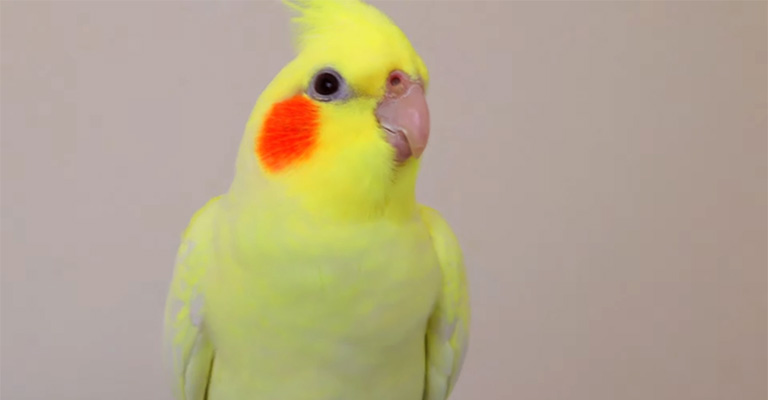
Respiratory infections are a common cause of coughing in cockatiels. These infections can be acquired through various sources and environments.
Understanding where cockatiels are most susceptible to respiratory infections can help bird owners take necessary precautions to minimize the risk.
Aviaries And Pet Stores
Aviaries and pet stores are places where cockatiels may come into contact with other birds, increasing the potential for the transmission of respiratory infections.
Birds housed close to each other, especially in overcrowded or unsanitary conditions, can quickly spread diseases. Cockatiel owners must be cautious when purchasing birds from pet stores or visiting aviaries.
Ensuring that the facility follows proper hygiene practices, maintains good air quality, and conducts regular health checks can help reduce the risk of respiratory infections.
Bird Shows And Exhibitions
Exposing cockatiels to bird shows and exhibitions can also pose a risk of respiratory infections. These events gather birds from various sources, increasing the chances of disease transmission.
The stress of transportation, unfamiliar surroundings, and close contact with other birds can weaken the immune system of cockatiels, making them more susceptible to infections.
If attending such events, it is essential to be mindful of the hygiene practices and biosecurity measures in place. Avoiding direct contact with other birds and ensuring that the event organizers follow strict health protocols can help mitigate the risk of respiratory infections.
Contaminated Environments
Cockatiels housed in contaminated environments are at higher risk of developing respiratory infections. Dirty cages and bedding can harbour bacteria, viruses, and fungi that can compromise the bird’s respiratory health.
Regular cleaning and disinfection of the cage, perches, and toys are crucial to maintaining a clean and hygienic environment for the bird. Proper ventilation is also essential to prevent the buildup of airborne pathogens.
Inadequate airflow can create a stagnant and humid climate, increasing the likelihood of respiratory issues. Providing adequate ventilation and avoiding exposure to drafts can help keep cockatiels in a healthier environment.
How Can Cockatiel Coughing Be Diagnosed?
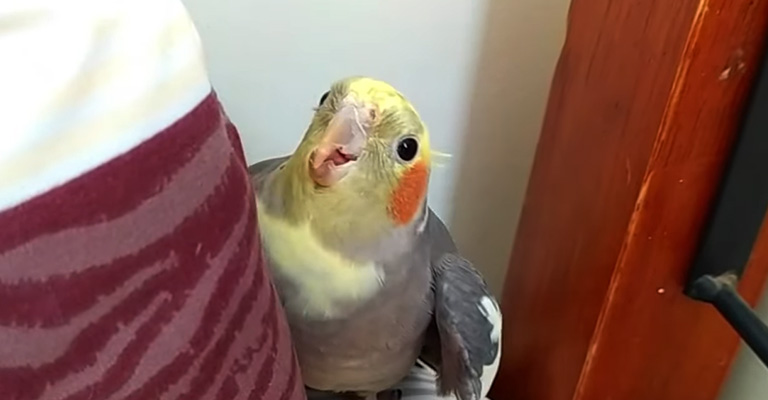
Cockatiel coughing can be a problematic symptom for bird owners, prompting the need for an accurate diagnosis to identify the underlying cause.
Veterinary examination and diagnostic tests are crucial in determining the cause of coughing and formulating an appropriate treatment plan for the affected cockatiel.
Veterinary Examination
Physical Examination
During a physical examination, a veterinarian will carefully examine the cockatiel for any visible signs of respiratory distress. They will observe the bird’s breathing pattern, check for any nasal or eye discharge, assess the colour and texture of the feathers, and listen for abnormal sounds in the lungs or airways.
History and Symptoms Evaluation
Gathering a detailed history from the owner is essential to understand the cockatiel’s overall health and any potential environmental or dietary factors that may contribute to the coughing.
The veterinarian will inquire about the duration and frequency of the cough, any changes in behavior or appetite, recent exposure to other birds, and the bird’s living conditions.
Diagnostic Tests
X-rays and Radiographs:
X-rays and radiographs can provide valuable information about the condition of the bird’s respiratory system. They help visualize the structures of the chest, lungs, and air sacs, allowing the veterinarian to identify any abnormalities such as fluid accumulation, air vasculitis, or signs of infection.
Blood Tests
Blood tests can help assess the overall health of the cockatiel and detect any underlying infections or nutritional deficiencies that may contribute to coughing.
Complete blood count (CBC), biochemistry profile, and specific disease screening tests can aid in diagnosing respiratory infections or systemic health issues.
Swabs and Cultures
Swabs and cultures involve collecting samples from the bird’s throat, nostrils, or any lesions present for laboratory analysis.
These samples are examined to identify the presence of specific pathogens, such as bacteria or fungi, which may be causing respiratory distress in the cockatiel.
How To Treat Cockatiel Coughing?
Cockatiel coughing can indicate underlying respiratory issues that require appropriate treatment for the bird’s well-being. Addressing the cause of the cough is crucial to provide effective treatment.
Treatment Options For Respiratory Infections
Respiratory infections in cockatiels can be caused by bacteria, fungi, or viruses. In such cases, antibiotics, antifungal medications, and antiviral drugs may be prescribed by a veterinarian to combat the specific infection.
Environmental Management
Improving air quality within the cockatiel’s environment is essential for respiratory health. This includes regular cage cleaning, minimizing dust and allergens, and eliminating potential irritants such as smoke or strong chemical fumes.
Nutritional Changes And Supplements
A balanced diet is vital for the overall health of cockatiels. In the case of coughing, ensuring the bird receives adequate Vitamin A supplementation and incorporating fresh fruits, vegetables, and probiotics can help support respiratory and gut health.
FAQs
Cockatiels cannot catch colds from humans directly. However, they can be susceptible to certain respiratory infections, including avian influenza, which humans can transmit if proper hygiene measures are not followed.
Suppose your cockatiel’s coughing persists for more than a day or is accompanied by other symptoms such as lethargy, loss of appetite, nasal discharge, or difficulty breathing. In that case, it is crucial to consult a veterinarian. These could indicate a more serious underlying health issue.
Ensure proper ventilation in your cockatiel’s living area to improve air quality. Regularly clean the cage and remove any accumulated dust or feathers. Avoid using strong-smelling cleaning agents or spraying any aerosols near your bird. It’s also advisable to keep your cockatiel away from smoking areas.
Yes, cockatiels can develop allergies to various environmental factors. Common allergens include pollen, dust, strong fragrances, and cigarette smoke. If you suspect your cockatiel has allergies, try to identify and eliminate the source of the allergen from its surroundings.
If you suspect your cockatiel has inhaled a foreign object and is experiencing coughing or respiratory distress. As a result, it’s crucial to seek immediate veterinary attention.
Please do not attempt to remove the thing yourself, as it may cause further harm. The veterinarian will have the necessary equipment and expertise to assess and address the situation safely.
Conclusion
Coughing in cockatiels can indicate various underlying health issues, including respiratory infections, allergies, poor air quality, environmental irritants, or foreign object inhalation.
It’s crucial to monitor your cockatiel’s health closely and seek veterinary attention if coughing persists or is accompanied by other concerning symptoms.
Addressing the underlying cause and making necessary environmental modifications can help your cockatiel recover and maintain optimal respiratory health.
Remember to consult an avian veterinarian for a proper diagnosis and treatment plan tailored to your cockatiel’s needs.